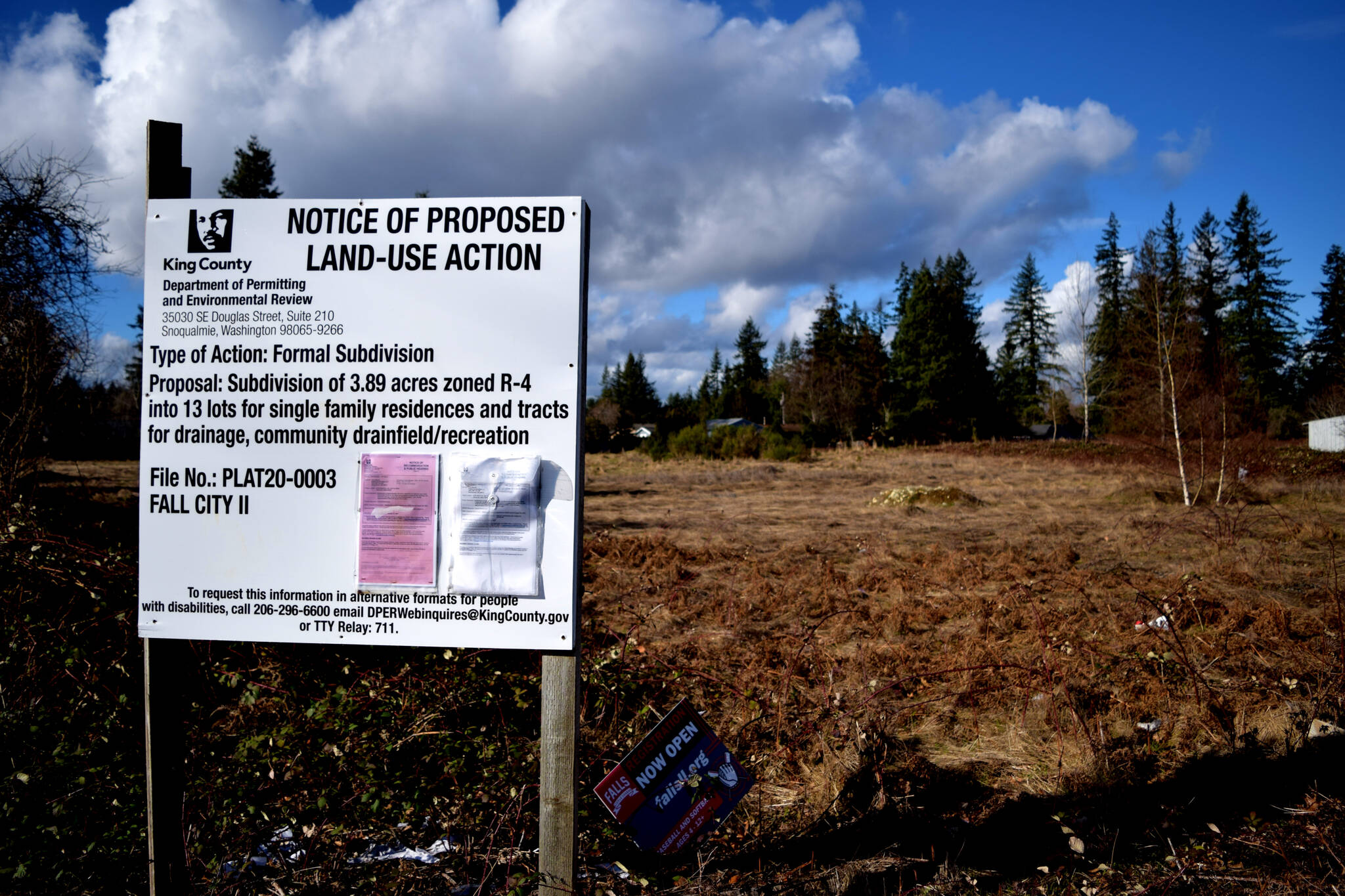Fall City residents advocating for development reform scored a victory last week, as the county issued a temporary moratorium on new subdivisions in the rural town.
For the next seven months, applications for residential subdivisions, meaning five or more lots, will be prohibited within Fall City’s boundary.
The pause allows county officials to complete a work plan to study zoning, setbacks, rural character and land use ahead of major policy decisions. The work plan will help determine if additional regulation is needed for future Fall City developments.
A public hearing on the moratorium will also be held in two months.
“This is a huge win for Fall City in my opinion,” said Mike Suelzle, a resident and member of Fall City Sustainable Growth, a recently formed group of residents advocating for reforms.
The moratorium comes amid an unprecedented influx of housing subdivisions being permitted throughout Fall City by Taylor Development, a Bellevue-based developer.
Taylor has permitted seven subdivisions, which are expected to bring in 121 new homes and increase the town’s population by 20% in only a few years. A representative for Taylor did not return a voicemail seeking comment.
All seven developments are vested, meaning they will not be affected by the moratorium, but the county has received notice of interest to subdivide additional lots, according to documents.
King County Councilmember Sarah Perry, who sponsored the moratorium, said the pause will give the county time to decide if any policy changes are needed before additional subdivisions can happen. The goal is not to prevent growth, she emphasized, but to consider how growth should happen in rural areas, noting the permitting process has outpaced the county’s response.
Perry has worked closely with town residents and the Fall City Community Association, which requested the moratorium as the county prepares to make significant future planning decisions. King County’s comprehensive plan, a long-range planning document that will guide growth over the next two decades, is due for an update next year.
“They came together and did amazing work in engaging feedback from their residents,” Perry said. “They requested we take a pause to look into these elements.”
While controversial, Taylor’s developments are compliant with local zoning laws. But the properties have raised questions about regulating growth in the rural area.
Since the 1990s when the state adopted the Growth Management Act, a series of laws aimed at dictating where growth happens, there has been an effort to confine housing growth to city limits with mandates that cities plan for housing growth targets.
The goal is partially intended to limit urban sprawl into unincorporated areas and protect open spaces and rural areas. There are no growth targets for rural areas of King County, where growth is anticipated to happen at a rate of less than 1% per year.
Fall City, contrary to its name, is defined as an unincorporated rural town, one of just three areas in King County to receive that designation. The rural town label denotes an area where county planning documents have highlighted a desire to preserve “rural character.”
Yet, while the Growth Management Act and planning documents highlight a need to protect rural areas, there is little in King County’s code that outlines what preserving “rural character” means.
Residents argue it is an oversight that’s left the door open for Taylor to bring in a series of urban-style subdivisions, which some residents would like to change for future projects.
The moratorium passed the King County Council by a 6-3 vote. Councilmembers landed on different sides on whether housing developments should be halted as the region faces a massive housing shortage.
“When I think about moratoriums on residential development, my housing crisis brain gets triggered,” Councilmember Girmay Zahilay said prior to the vote. “I don’t think I’ve heard enough to override the housing crisis brain.”
Perry acknowledged the importance of building more housing, but drew a distinction for unincorporated areas.
“Each of my colleagues on the council, while they want to make sure we have enough housing,” she said, “they also understand that the community in unincorporated King County is different.”


